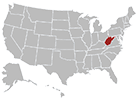
Veterinary technicians assist licensed veterinarians in providing the best health-related help to animals in need.
If you want to be one of them and you live in West Virginia, read this guide!
Page Navigation
- Veterinary Technician Job Description and Duties in West Virginia
- Education and Training Required for Veterinary Technicians in West Virginia
- Becoming a Licensed Veterinary Technician in West Virginia
- Employment and Salaries for Veterinary Technicians in West Virginia
- Additional Information for Veterinary Technicians in West Virginia
Veterinary Technician Job Description and Duties in West Virginia
One of the first things to know is that your days are generally full and you’ll interact with all sorts of people and animals.
Most commonly, you’re supposed to perform these tasks:
- Administering medications
- Taking x-rays,
- Processing tissue samples,
- Assisting in surgery and emergency care
- Performing lab tests
- Teeth cleaning,
- Electrocardiography,
- Bandaging,
- Wound cleaning,
- Maintaining detailed and accurate records of meds, supplies, patients
You cannot perform surgeries nor prescribe medication or treatments.
Education and Training Required for Veterinary Technicians in West Virginia
You have to earn a license before starting working as a vet technician in West Virginia.
For this you’ll undergo training for at least 2 years, to learn the ins and outs of this occupation.
By the end of this training, you can earn an Associate’s degree.
You can spend some 4 years studying and earn a Bachelor’s degree if you want.
However, you have to pay attention to the program’s accreditation: it needs to be from the American Veterinary Medical Association.
In the table below you can see the schools in West Virginia that offer such programs.
Top 4 Schools in West Virginia
| School Name | Address |
|---|---|
| BridgeValley Community & Technical College | 2001 Union Carbide Dr, South Charleston, West Virginia 25136 |
| Carver Career Center | 4799 Midland Dr, Charleston, West Virginia 25306-6397 |
| Mountwest Community & Technical College | One Mountwest Way Huntington, WV 25701 |
| Pierpont Community and Technical College | 1201 Locust Ave, Fairmont, West Virginia 26554 |
Keep in mind that due to the low number of spots in these programs, you’ll have to apply for a course.
Application requires:
- A high school diploma or GED
- The completion of some classes right before enrolling in the degree program
- 2 letters of recommendation
- One of them must come from a veterinarian
- Health insurance
- Passing a drug test
- Passing a TB test
- Getting some vaccines, especially the one against rabies
- Buying a medical malpractice policy
Once you start the program, you’ll study:
- Introduction to veterinary technology
- Anatomy and physiology
- Emergency care and first aid
- Pathology
- Anesthesiology
- Radiology
- Immunology
- Pharmacology
- Parasitology
- Toxicology
- Nutrition
These programs also mandate a period of practice in an approved clinic.
Your hands-on training includes:
- Medical Terminology
- Basic Comparative Animal Anatomy and Physiology;
- Veterinary Office Procedures;
- Basic Pharmacology;
- Practical Animal Nutrition;
- Nursing Care and Handling of Animals;
- Animal Behavior;
- Applied Radiography;
- Applied Anesthesiology;
- Applied Clinical Laboratory Procedures;
- Principles and Practices of Medical and Surgical Assistance;
- Animal Diseases.
Becoming a Licensed Veterinary Technician in West Virginia
In this state, you must become licensed by the West Virginia Board of Veterinary Medicine.
You’ll need these documents:
- An application form
- Proof you graduated from the training program described earlier
- Some fees
- $300 for the exam
- $100 for the license
- Your score on the Veterinary Technician National Examination (VTNE)
The National Exam has a limit of 3 hours and 150 questions.
You’ll have to answer at least 70% of them correctly.
You will need to attend 12 classes of education to keep your license current every year.
Make sure to send in an application and a renewal fee as well.
Employment and Salaries for Veterinary Technicians in West Virginia
Knowing a thing or two about the company you’ll work at is doing due diligence and improve your chances of getting hired.
In West Virginia, some of the facilities you can work for are:
- Private clinical practices
- Zoos
- Veterinary teaching hospitals
- Rescue centers
- Wildlife or exotic animal rehabilitation centers
- Humane societies,
- Research facilities,
- Feedlots,
- Pharmaceutical companies
You might want to apply for a position with these companies first:
- State of West Virginia Animal & Plant Industries (Charleston)
- Saving Animals From Euthanasia (Whitman)
- South Huntington Animal Hospital (S Huntington)
- Allegheny Equine (Elkins)
- Animal Friends-North Central (Morgantown)
- Animal Urgent Care Center (Wheeling)
- Southern West Virginia Animal League (Princeton)
- Mighty Mutt Rescue (Belington)
- Forever Friends Animal Rescue WV, Inc (Baker)
Of course, how much you’ll earn is an important aspect of your future.
Your salary as a vet technician will depend on a variety of factors, including location.
Annual Salary Range:Average Salary of Veterinary Technicians in West Virginia
| City Name | Salary |
|---|---|
| Charleston | $33,760 |
| Huntington | $33,104 |
| Parkersburg | $32,911 |
| Wheeling | $36,284 |
| Morgantown | $36,284 |
| Weirton | $36,159 |
| Fairmont | $36,284 |
| Beckley | $33,463 |
| Clarksburg | $32,614 |
| Martinsburg | $41,072 |
Additional Information for Veterinary Technicians in West Virginia
There are many times when you need information or help to find employment.
Use these resources:
- West Virginia Board of Veterinary Medicine
- National Association of Veterinary Technicians in America
- West Virginia Association of Veterinary Technicians
- West Virginia Board of Veterinary Medicine




